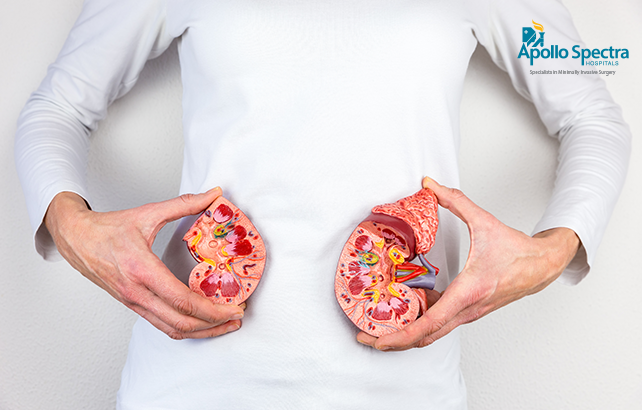Kidney Stones: Don't Ignore These 5 Signs
January 22, 2018
Kidney stones are small hard deposits that form in the kidneys and are usually painful when passed. The stones may vary in size and accordingly impact the kidney and urinary tract. Normally, the small stones may be passed out without any symptoms but sometimes the stones may block the ureter (the duct through which urine passes from the kidney to the bladder) and cause pain or infections. If the stones cause extremely severe pain, the condition needs immediate treatment or medical attention.
So what causes kidney stones?
An imbalance of various chemicals in the urine leads to stone formation. The most common chemicals are calcium, oxalate, citric acid, uric acid, and cysteine. An imbalance of these chemicals, such that the urine levels are in excess triggers the formation of crystals. An accumulation of these in the kidney results in kidney stone formation. Usually, they are caused due to certain medical conditions; however one is at the risk of developing stones with certain lifestyle habits also. To avoid kidney infection, one must know this kidney disease’s symptoms:
Kidney pain
One may experience abdominal pain due to the build-up of stones. It is usually characterized by a fluctuating, sudden and severe pain. In some cases, one may experience back pain, or pain in the genitals or groin.
Blood in urine
Blood in the urine is a very common symptom, accompanied by abdominal pain. Sometimes an unpleasant odour along with discolouration is experienced. Discolouration occurs in the form of pink, red or brown colored, cloudy urine. This bleeding occurs due to friction between the stone and the ureter- causing a difference in urine color. However, some kidney infections also result in similar symptoms, so getting the kidney checked will ensure safety and clarity.
Painful & frequent urination
Painful and frequent urination is common in people who have kidney stones. Pain in the morning is more common because urination is more frequent during the day. Frequent urination is one of the earliest and most common signs.
Fever, vomiting, and nausea
Fever and chills, along with vomiting can also occur with kidney stones. As the body is unable to eliminate any waste, vomiting is a way for the body to get rid of toxins- considering that the kidney is unable to function effectively.
Repetitive urinary tract infections
Kidney stones can cause urinary tract infections (UTIs). If a UTI occurs again despite treatment or the medication isn’t effective enough- it could be due to stone formation. One should not ignore these common signs of kidney stones as this may trigger chronic kidney infections and kidney diseases. However, these symptoms are also closely related to the symptoms of kidney failure and one should get a kidney test done to ensure safe kidney health. The urology department of Apollo Spectra Hospitals specializes in advanced endoscopic and laser treatments for kidney stones with a near-zero infection rate. Live pain-free, our experts will ensure proper medication and treatment of your stones and the best of kidney health!
NOTICE BOARD
CONTACT US
CONTACT US
 Book Appointment
Book Appointment


.svg)
.svg)
.svg)
.svg)








